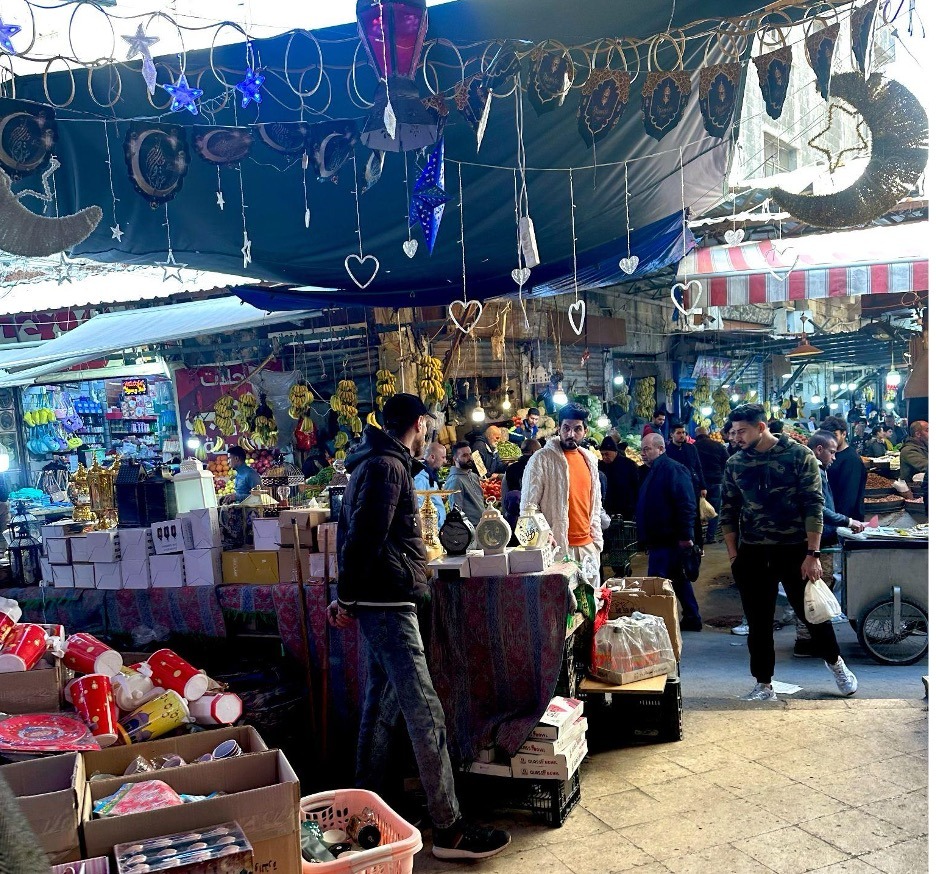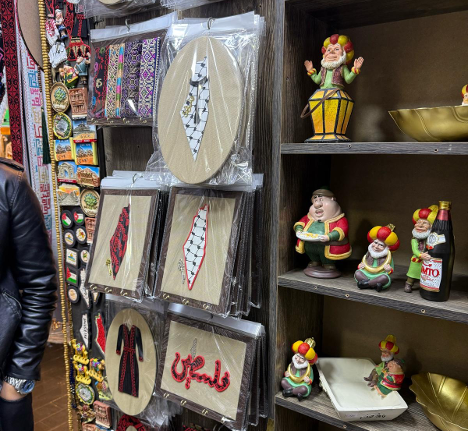
Ramadan Lights Dim in the Shadow of Looming War
By Hannah Raslan

As the last day of Ramadan unfolds in Amman, the air is thick with the hum of anticipation and the bittersweet realization that another month of fasting and prayer has come to an end. Tonight, the streets of downtown brim with last-minute shoppers, vendors calling out their final Ramadan deals, and families taking in the atmosphere one last time before Eid. While this year saw a return of some Ramadan traditions, it was still far from the grand celebrations of years past, before the war in Gaza cast a long shadow over the region.
In the early days of Ramadan, as the city prepared for the holy month, there was optimism in the air. People spoke of Gaza’s ceasefire with cautious hope, believing that peace might hold long enough to allow for some relief throughout this holy month. But as the month progressed, that hope began to fade. Netanyahu’s surprise airstrikes on Gaza on March 18th, which broke the fragile ceasefire, brought a sharp turn in the mood – from optimism to anguish for the suffering that felt all too close to home.
Just a few weeks ago, in the early days of Ramadan, downtown Amman was full of life. The lights and decorations that adorned the streets were bright and vibrant, a contrast to the absence of decorations the previous year as many residents chose not to celebrate. The festive spirit was palpable, and the promise of a peaceful Ramadan seemed within reach.
On the first Thursday of Ramadan, driving into the center of the city, taxi driver Mahmoud pointed to the decorations and lights lining the crowded streets. He emphasized that these decorations were all new compared to last year.
Ahmed, 22, perched on a stool at the top of a narrow staircase, its walls lined with figurines from the Ramadan-themed cartoon show “Fananees” and tatreez-embroidered maps of Palestine. He was grateful that Ramadan was in the winter this year where the days were shorter. Ramadan, the ninth month of the Islamic calendar, begins earlier each year. In the summer months, more daylight means a longer fast.

Ahmed looked forward to having his entire family gathered around one table during Eid. Despite his Gazan roots, he felt a strong sense of belonging in Jordan, a country that welcomed refugees and foreigners alike, he remarked.
"It is an important time for family," he added. This year, after the ceasefire in Gaza, people celebrated Ramadan more than last year. Sales had increased, Ahmed said of his store, but not as much as he would have liked.
Ahmed noticed it had begun to rain. He grabbed a few clear plastic umbrellas and hung them outside the front door. “One dinar,” he announced to passersby, selling a few to those desperate to keep their clothes dry. A few stood under the short awning seeking refuge from the rain. In good manners, they exchanged greetings and Ramadan blessings.
Across the street, an older man in a red fez sat on a stool in front of a quaint perfume shop, playing his oud. His long brown robe billowed as he strummed a familiar Umm Kulthum melody, his fingers plucking each note with care. A small crowd gathered around him, drawn in by the nostalgia of the song, their expressions softening as they swayed to the music. Nearby, the shopkeeper seized the moment, calling out to onlookers, "Every video, 50 qirsh!" — the price if they planned to stop and listen.
A few alleys down, a coffee seller stood behind his modest cart, tucked away in a small side street lit by Ramadan lanterns. The familiar voice of Maher Zain’s hit song "Ramadan" drifted through the air. Ahmed, a man in his early 30s, handed over two small cups of steaming Arabic coffee. He refused our attempts to pay, shaking his head with a smile. "Khalini a'azmkom," he insisted. "Join me for coffee."
This type of generosity is common during Ramadan, with locals often treating foreigners to coffee or sweet treats in the charitable spirit of their religion. When asked about Ramadan this year, he gestured to the string lights and the decorations lining the alley. "Last year, none of this was here."
As Amman taxi driver, Abu Ibrahim, expertly weaved through the chaotic traffic, he reflected on the changing nature of Ramadan. Horns blared at every roundabout; drivers inched forward aggressively, cutting one another off in frustration. "People are angry when they are fasting," he muttered, honking as someone abruptly swerved in front of us. "Everyone just wanted to get home before sunset."
Abu Ibrahim’s grievances extended beyond traffic. "Ramadan should be about spirituality, but people care more about food now," he said, shaking his head. "The second Iftar starts, all they do is smoke and eat. No one thinks about prayer anymore."
Despite the return of decorations, Abu Ibrahim insisted that Ramadan still wasn't what it once was. "There used to be markets, plays, celebrations everywhere,” he remarked. For him, the events in Gaza had permanently shifted the culture of Ramadan.
As the end of the holy month approaches, the city exhales. Tomorrow, Amman will awaken to Eid, a day of joy, but also reflection. This Ramadan brought back glimpses of past celebrations, but the weight of the world still lingers, heavy in the air. For many, the lights are on again—but they do not shine as brightly as before.
Post a comment